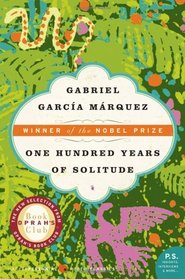Helpful Score: 2
First off, if you're going to read this, make sure that you can devote a little time each day to read it. This is not the sort of book that you put down and don't pick up again for a week! It's the story of a family in a fictional town called Macando. The story spans centuries (or so it seems, the author purposefully neglected to put any dates in the story, just historical milestones and clothing descriptions that give you a vague sense of what era the characters are in), and covers generations of this one family. The characters are confusing, in that the men in the family are all named Aureliano, Jose Arcadio, or a variation or mixture of those names; the women are a bit easier to remember, but I would have lost my mind if the author hadn't added a family tree for me to constantly reference in the front of the book.
All that said, this was a wonderful story. I felt connected with this family by the time I got about 50 pages in, and I either loved or loathed the characters - there was no middle ground. This book taught me to read very carefully and with intent, b/c the magic realism that the author used sometimes caused things that any reader would find important (like, say, the death of a young mother/main character from miscarriage or the massacre of villagers) to be brought up in a single sentence and never spoken of again, almost nonchalantly. Whereas one man's obsession with translating old scrolls takes up entire chapters. But it's this realism that makes the unbelievable, well...believeable. It's what allows one woman to outlive her all of her children AND some grandchildren, and for another to be so beautiful that any man who sees her face goes mad with lust and dies a horrible death. It allows for the spirits of the dead to go strolling on through a house for no particular reason other than to just hang out among the living, and it allows for a wanted man to become invisible (no, really, INVISIBLE) to government soldiers at the most opportune moment.
I enjoyed this book, and am planning to read "Love In The Time of Cholera" next!
All that said, this was a wonderful story. I felt connected with this family by the time I got about 50 pages in, and I either loved or loathed the characters - there was no middle ground. This book taught me to read very carefully and with intent, b/c the magic realism that the author used sometimes caused things that any reader would find important (like, say, the death of a young mother/main character from miscarriage or the massacre of villagers) to be brought up in a single sentence and never spoken of again, almost nonchalantly. Whereas one man's obsession with translating old scrolls takes up entire chapters. But it's this realism that makes the unbelievable, well...believeable. It's what allows one woman to outlive her all of her children AND some grandchildren, and for another to be so beautiful that any man who sees her face goes mad with lust and dies a horrible death. It allows for the spirits of the dead to go strolling on through a house for no particular reason other than to just hang out among the living, and it allows for a wanted man to become invisible (no, really, INVISIBLE) to government soldiers at the most opportune moment.
I enjoyed this book, and am planning to read "Love In The Time of Cholera" next!
Helpful Score: 1
Wow. What a different kind of book. You see a family heritage move through its history of one hundred years. Fascinating view point.
Helpful Score: 1
I have read this book many times, both in Spanish and English. Being a native Spanish speaker, I was a bit apprehensive about reading the English version of the book.
This translation is probably the best I've read. The translator was able to capture the essence of Garcia Marquez.
In my opinion, this is the best of Garcia Marquez' books. and my favorite.
This translation is probably the best I've read. The translator was able to capture the essence of Garcia Marquez.
In my opinion, this is the best of Garcia Marquez' books. and my favorite.




